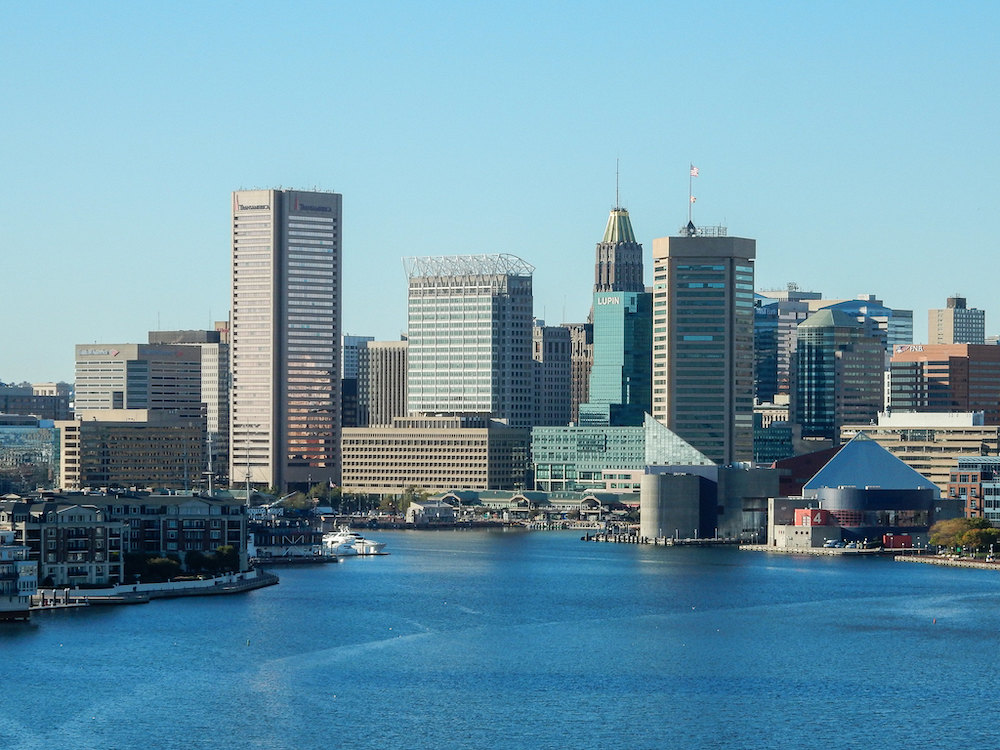While the collapse of Silicon Valley Bank (SVB) may have compelled VCs to tighten their spending across the board, the downward trend that the just-released Q1 Venture Monitor report indicates the Baltimore metropolitan statistical area (MSA) experienced could actually belie signs of upward momentum for the region’s startup ecosystem.
This mixed but ultimately positive analysis comes from the statistics reported in the aforementioned quarterly publication, which the National Venture Capital Association (NVCA) and PitchBook dropped Thursday, as well as a secondary analysis from local startup economy booster UpSurge Baltimore.
Here, like last quarter and many before that, Technical.ly breaks down what picture the Venture Monitor paints about Charm City’s VC and economic market — starting with the new report itself.
What the Venture Monitor suggests
In Q1 2023, the Baltimore MSA boasted $83.47 million raised across 15 deals. This represents a decline from Q4 2022’s $164.3 million across 21 deals, but something similar to both the $84.41 million across 18 deals in Q3 2022 and the just over $84 million through 19 deals in Q2 2020.
Despite the geographical issues in the Venture Monitor’s catalogs of top deals — for instance, the recurring misunderstanding of what companies reside in Baltimore — the region’s VC activity still has room for growth. And despite describing an “abysmal” quarter in which “just $11.7 billion was raised” across the country, the Venture Monitor’s own executive summary seems to recognize this potential as a national possibility, as well.
“VC is not a short-term business,” it reads. “Investors need to be confident to invest entire portfolios in assets that are mostly illiquid for years. Countless factors, including the COVID-19 pandemic, the Russian invasion of Ukraine, and deglobalization have upended decades of received wisdom and thrown a mature business cycle into chaos.”
Baltimore MSA’s top deals in Q1 2023
- On February 15, Apkudo, a company in Baltimore’s Canton neighborhood specializing in optimizing the connected device circular supply chain through purpose-built software and hardware, raised nearly $38 million in a later stage Series C.
- Sunstone Credit, which aims to provide flexible clean energy financing for businesses of all sizes (including solar loans with borrower-friendly terms), raised $20 million in an early stage Series A in January.
- Novel Microdevices, a company on Seaforth St. that detects the genetic material of pathogens using nucleic acid amplification techniques (NAAT), raised $5 million in a later stage Series A fundraising round by mid-January.
- Marinalife, an online boat slip reservation service HQed on East Fort Ave. that provides tools and resources to support the boating community, raised $5 million in a later stage Series A fundraising round by the end of January.
- Cerebro Capital, an online platform that connects middle-market borrowers with credit facilities, secured $3.5 million just ahead of spring on March 14 in its latest Series D round. This comes after the company raised $2.4 million in August 2023.
- SLICK, a managed services provider for fleet services located on Cockeysville Road in Baltimore County, raised about $3 million in a later-stage fundraising round on January 25.
- Biotech company Sonavex also logged about $3 million in what the Venture Monitor described as a “Series A2” near January’s end.
- Following the trend, Previse, a developer of novel diagnostic tests located inside Sinai Hospital in West Baltimore, raised $3 million in a seed round on March 21.
- Flavocure Biotech, which aims to transform natural products into new cures for patients, raised $1 million in a seed round on January 4, just as the new year began.
- Last but not least: Vheda Health, a virtual health engagement company, raised $1 million in a later stage round on January 6, just as the new year began.
A closer regional look
UpSurge Baltimore CEO Jamie McDonald, supported again by data-tracking from colleague and data analyst Chris Brunner, told Technical.ly that she feels Baltimore companies are getting funding in a choppy market.
“It’s a tough time everywhere for companies to raise money across all stages. And, it’s particularly challenging in a diverse ecosystem like Baltimore … even that much more challenging for early stage companies, because [of] a lot of the retrenchment with VCs,” said McDonald, using a term that references when a venture capitalist might reinvest in the same company instead of investing in a new one.
UpSurge, which uses a unique equity-centered approach to ecosystem-building, has claimed to have a more comprehensive list of investment deals in the city’s first (and every) quarter than traditional sources like PitchBook. McDonald explained that PitchBook’s data collection process involves an “internet scraping mechanism” to find filed deals and references to bids from other data sources, which may not appear in formal reports until later. Even with a sizeable contribution to its blog, the PitchBook Report Methodologies remain shrouded in a seeming cloud of jargon and numbers.
UpSurge’s process instead aims for inclusivity by providing a fuller picture of investment activity in the Baltimore area alone. This technique could mean that UpSurge’s own Q1 Venture Monitor-like report contains data not yet available in other publications. Furthermore, UpSurge’s data collection may fulfill recommendations made in a 2017 report by Johns Hopkins University’s 21st Century Cities Initiative, which called for the enhancement of measuring, tracking and reporting systems for capital in Baltimore’s business ecosystem.
Technical.ly teamed up with UpSurge to produce the following list, which features some businesses from PitchBook’s list with amended amounts that reflect UpSurge’s presumably closer eye on the Baltimore VC landscape. This list has been edited for clarity and comes with the following legend:
UpSurge data is compiled via PitchBook deals and reconciled with ecosystem deals not captured by the software. PitchBook and UpSurge are constantly collecting historical data that alter the numbers of future reports.
UpSurge Baltimore’s list:
- Apkudo raised $37.5 million with the assistance of Closed Loop Partners, a New York-based investment firm.
- BigBear.ai, a Columbia-headquartered AI startup, secured $25 million in a later-stage venture capital funding round. McDonald emphasized that this was a PIPE deal and is “a very unusual deal type.”
- Sunstone Credit the aforementioned $20 million in a recent funding round.
- Ryse Health, a Baltimore and Arlington, Virginia-based healthtech company, raised $9.79 million in a recent funding round to support its mission of improving patient outcomes through innovative digital solutions.
- Secretome Therapeutics, a Baltimore-based biotech startup focused on developing novel protein therapeutics, has raised $6.85 million in its seed funding round to advance its preclinical pipeline and accelerate the development of its lead candidates.
- Novel Microdevices raised $5.15 million in funding with the assistance of TEDCO.
- Marinalife raised $5 million through an investment from Claritas Capital, a Nashville-based firm that specializes in growth-stage investments.
- Cerebro Capital raised $3.45 million in its latest funding round, which will enable the company to expand its services and reach more customers.
- Previse, a Baltimore-based health tech startup that provides a personalized platform for preventive healthcare, raised $3 million in its seed funding round with the participation of investors like Gaingels and Riptide Ventures.
- Sonavex raised $3 million in funding with the support of Treedom House, a venture capital firm that invests in early-stage healthcare startups.
A focus on healthcare
PitchBook and UpSurge’s analyses collectively highlight the momentous landscape of Baltimore’s biotech and life sciences world. The healthcare industry unsurprisingly holds five of the top 10 deal spots in PitchBook’s report on Q1 — which dropped a few short weeks after the MedTech Innovator Accelerator’s three-day East Coast Pitch Event.
In 2017, the 21st Century Cities Initiative’s aforementioned documentation of investment in Baltimore City-based small companies found that almost half of all dollars and nearly 40 percent of all funding rounds went to companies in pharmaceuticals, biotech and healthcare. That seems to ring true in 2023, too.
Before you go...
Please consider supporting Technical.ly to keep our independent journalism strong. Unlike most business-focused media outlets, we don’t have a paywall. Instead, we count on your personal and organizational support.
3 ways to support our work:- Contribute to the Journalism Fund. Charitable giving ensures our information remains free and accessible for residents to discover workforce programs and entrepreneurship pathways. This includes philanthropic grants and individual tax-deductible donations from readers like you.
- Use our Preferred Partners. Our directory of vetted providers offers high-quality recommendations for services our readers need, and each referral supports our journalism.
- Use our services. If you need entrepreneurs and tech leaders to buy your services, are seeking technologists to hire or want more professionals to know about your ecosystem, Technical.ly has the biggest and most engaged audience in the mid-Atlantic. We help companies tell their stories and answer big questions to meet and serve our community.
Join our growing Slack community
Join 5,000 tech professionals and entrepreneurs in our community Slack today!

The person charged in the UnitedHealthcare CEO shooting had a ton of tech connections

From rejection to innovation: How I built a tool to beat AI hiring algorithms at their own game

Where are the country’s most vibrant tech and startup communities?



